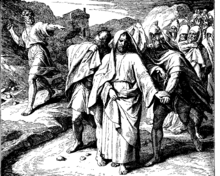Our website is made possible by displaying online advertisements to our visitors.
Please consider supporting us by disabling your ad blocker.
Shimei ben Gera

Shimei ben Gera is a Biblical figure from the Book of II Samuel and the Book of I Kings.[1] He was from the tribe of Benjamin and was related to King Saul. II Samuel relates that when King David was fleeing from his son Absalom, Shimei cursed him as he passed through the village of Bahurim:[2]
5. And when king David came to Bahurim, behold, there came out thence a man of the family of the house of Saul, whose name was Shimei, the son of Gera; he came out, and kept on cursing as he came. 6. And he cast stones at David, and at all the servants of king David; and all the people and all the mighty men were on his right hand and on his left. 7. And thus said Shimei when he cursed: 'Begone, begone, thou man of blood, and base fellow; 8. the Lord hath returned upon thee all the blood of the house of Saul, in whose stead thou hast reigned; and the Lord hath delivered the kingdom into the hand of Absalom thy son; and, behold, thou art taken in thine own mischief, because thou art a man of blood.'[3]
Shimei's curse has been interpreted as referring to the killing of Abner ben Ner and the death of Ish-bosheth, King Saul's general and son. Alternatively, other interpretation attribute Shimei's animosity to David from the fact that he saw David as the one who removed Saul's family from the throne.
The Talmud says that Shimei cursed David because of his sin with Bathsheba, calling him an adulterer, a Moabite, a murderer, an oppressor, and an abomination.[4]
Abishai ben Zeruiah, David's military leader, wanted to kill Shimei on the spot, but David did not permit him.
9. Then said Abishai the son of Zeruiah unto the king: 'Why should this dead dog curse my lord the king? let me go over, I pray thee, and take off his head.' 10. And the king said: 'What have I to do with you, ye sons of Zeruiah? So let him curse, because the Lord hath said unto him: Curse David; who then shall say: Wherefore hast thou done so?' 11. And David said to Abishai, and to all his servants: 'Behold, my son, who came forth of my body, seeketh my life; how much more this Benjamite now? let him alone, and let him curse; for the Lord hath bidden him. 12. It may be that the Lord will look on mine eye, and that the Lord will requite me good for his cursing of me this day.' 13. So David and his men went by the way; and Shimei went along on the hill-side over against him, and cursed as he went, and threw stones at him, and cast dust. [3]
After David's army defeated Absalom's force, as he crossed back over the Jordan River to return to Jerusalem, Shimei came with about 1,000 men to ask him for forgiveness.[5] Once again, Abishai asked permission to kill Shimei, but David forgave him. Some scholars attribute David's forgiveness to the desire to make peace with the Tribe of Benjamin.
According to Yalkut Shimoni, Shimei addressed David as follows: "The brothers of Joseph did him injury, but Joseph returned good for evil. Be thou as Joseph, and recompense me with good, though I dealt evilly with thee. It was not I alone but all Israel that entreated thee ill. They now await my fate, and if thou forgivest me, they will come and make peace with thee and surrender themselves to thee" (Yalḳ. ii. 151)[4]
However, on his deathbed, David instructed his son Solomon to deal appropriately with Shimei and punish him for his actions.[6]
Solomon followed his father's instructions. He ordered Shimei to move to Jerusalem and forbade him to leave the city on pain of death. For three years, Shimei obeyed the order and remained in Jerusalem, but after three years he left to pursue two slaves who escaped to the kingdom of Achish, king of Gath. When he returned to Jerusalem, Solomon had him put to death.[7]
- ^ "Easton's Bible Dictionary (1897)/Shimei". Wikisource, the free online library. 2008-09-01. Retrieved 2024-05-05.
- ^ "II Samuel 16:5-13". www.sefaria.org. Retrieved 2024-05-05.
- ^ a b "Page:JPS-1917-Universal.djvu/408". Wikisource, the free online library. 2016-10-02. Retrieved 2024-05-05.
- ^ a b
 Hirsch, Emil G.; McLaughlin, J. F.; Bache, Wilhelm; Lauterbach, Jacob Zallel (1905). "Shimei". In Singer, Isidore; et al. (eds.). The Jewish Encyclopedia. Vol. 11. New York: Funk & Wagnalls. p. 290.
Hirsch, Emil G.; McLaughlin, J. F.; Bache, Wilhelm; Lauterbach, Jacob Zallel (1905). "Shimei". In Singer, Isidore; et al. (eds.). The Jewish Encyclopedia. Vol. 11. New York: Funk & Wagnalls. p. 290.
- ^ "II Samuel 19:17". www.sefaria.org. Retrieved 2024-05-05.
- ^ "I Kings 2:8". www.sefaria.org. Retrieved 2024-05-05.
- ^ "I Kings 2:38-46". www.sefaria.org. Retrieved 2024-05-05.
Previous Page Next Page


